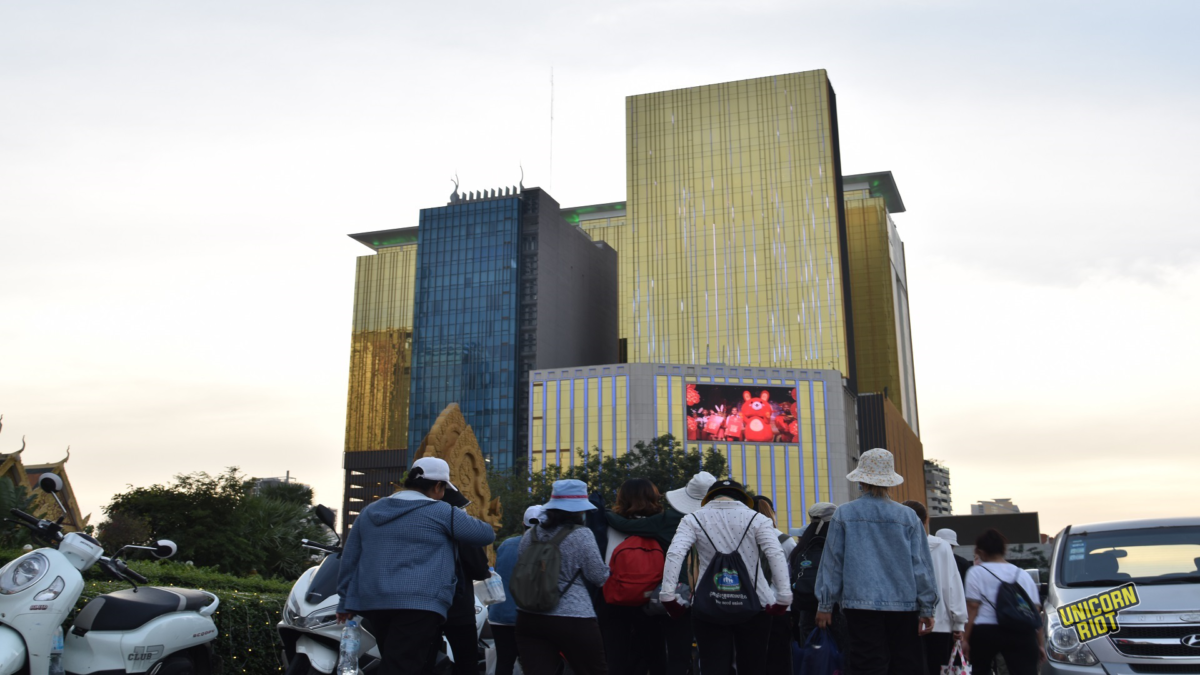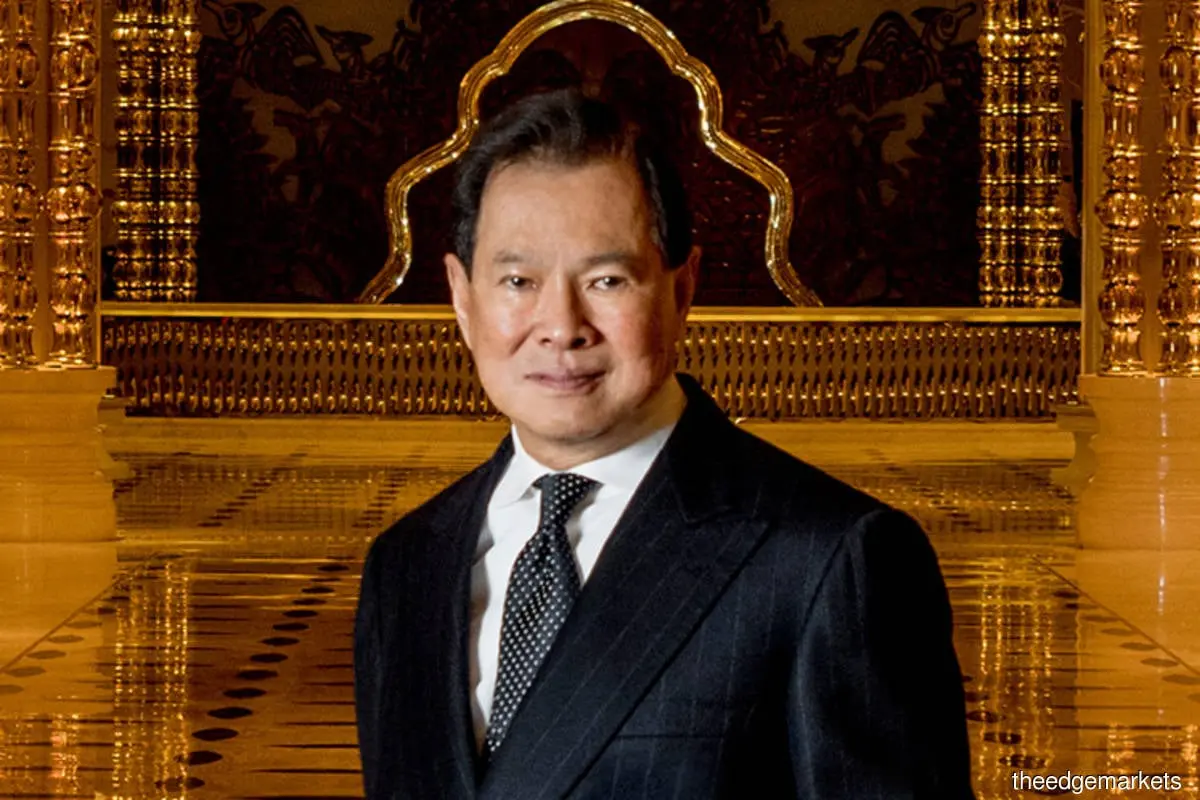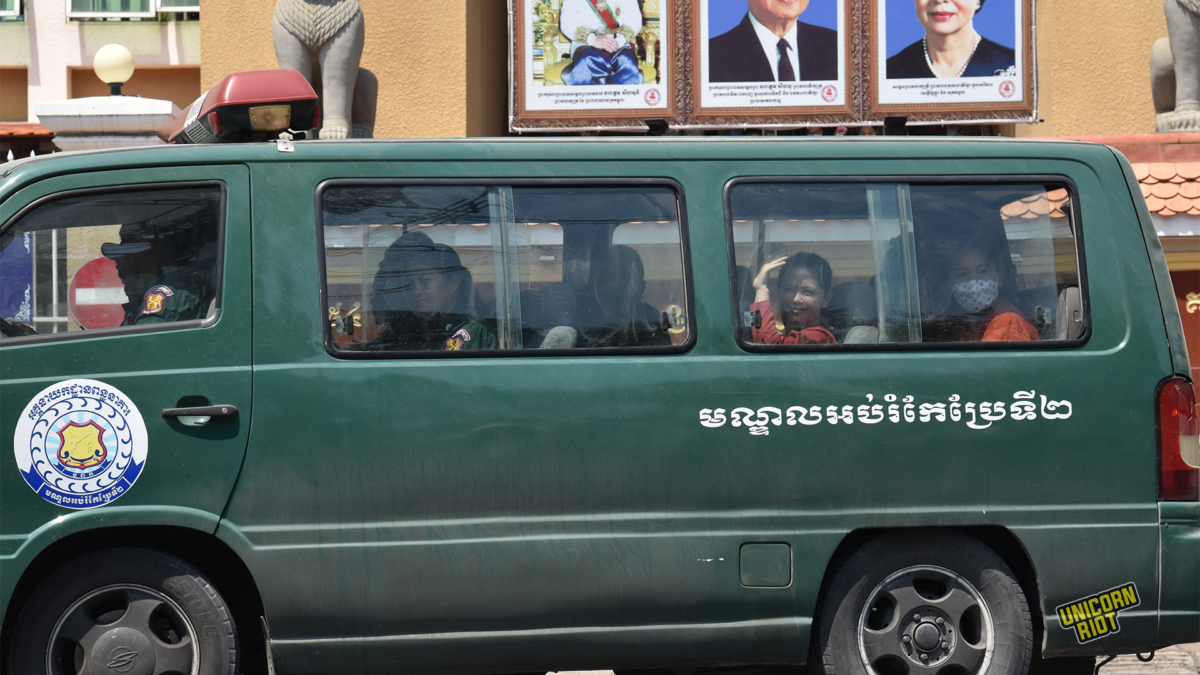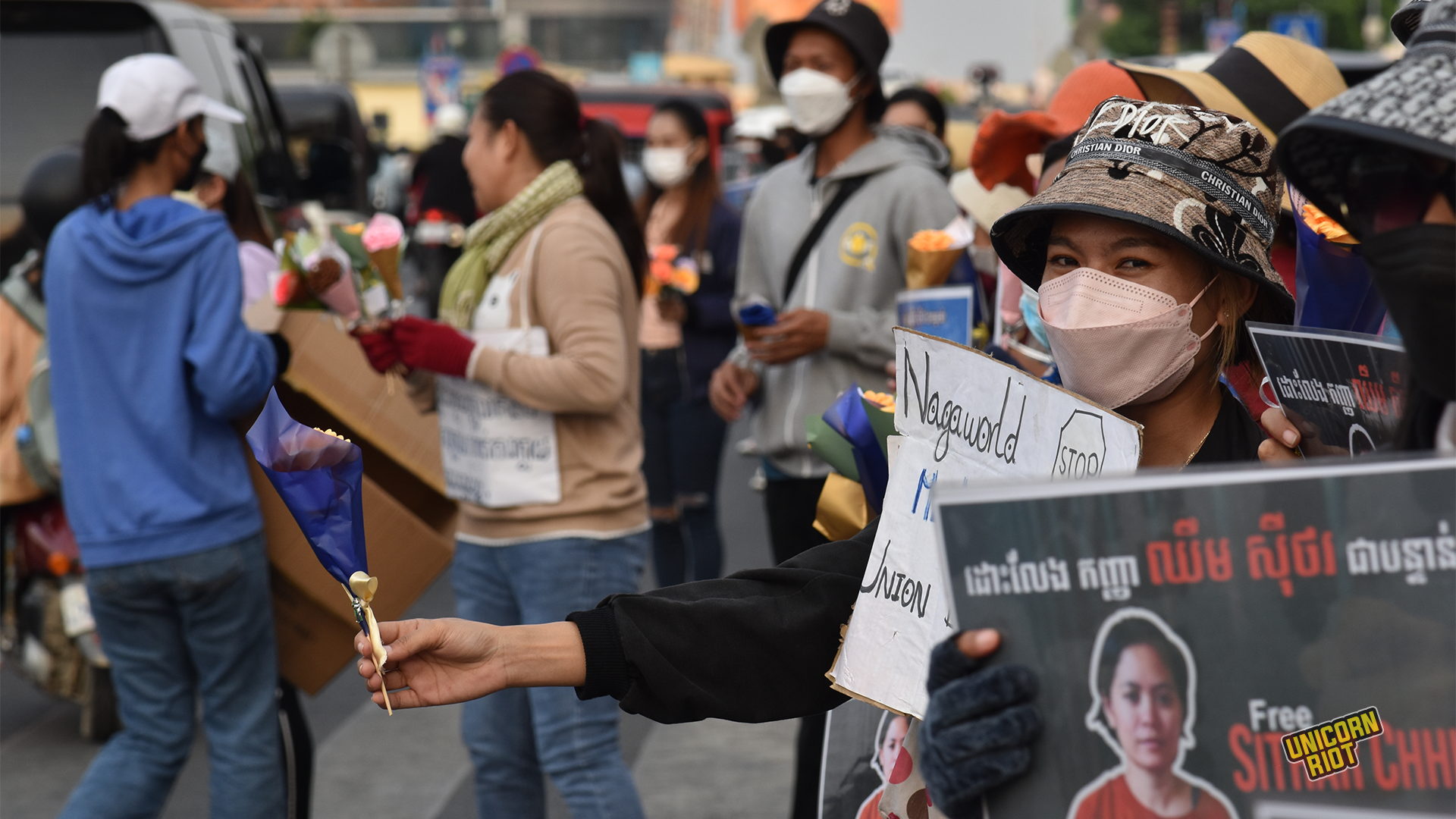The Battle at NagaWorld: The Longest Strike in Cambodian History PT. II
Phnom Penh, Cambodia — NagaWorld casino sits next to Phnom Penh’s nicest parks. It’s a short walk to some famous pagodas, the Royal Palace, and one of Prime Minister Hun Sen’s mansions. The popular attraction is a striking monument to King Sihanouk, the founding father of modern Cambodia, and a dominant political figure in the nation his entire life. Further beyond the king, in a sliver of the park cut up by main thoroughfares, sits a small and simple concrete monument with withered flowers at its base. With an outstretched arm stands the likeness of Chea Vichea, former president of the Cambodian Free Trade Union (CFTU).
See Part I: The Battle at NagaWorld (May 17, 2023)
Chea was tragically assassinated in 2004 while reading a newspaper just blocks away from the monument. He was an outspoken critic of Hun Sen and the ruling Cambodian People’s Party (CPP), and a charismatic, militant union leader. Merely months later, CFTU union leaders Ros Sovannarith and Hy Vuthy were also assassinated. The cases were never solved, and many in Cambodia believe that Hun Sen and other high ranking CPP officials were behind the murders.
Ten years after these gruesome murders, as the labor movement continued to expand its militancy and make more bold demands, garment workers launched a massive strike. The action culminated around demands to increase the minimum wage, but it quickly spread, and pulled in thousands of other workers and supporters into Phnom Penh streets. The strike was drowned in blood when at least four workers were killed by police (one 14 year old garment worker simply disappeared but witnesses claimed he was shot).
This very recent history is a constant reminder of just how frighteningly perilous things can get for union activists who organize, fight for workers’ rights, and dare criticize the ruling elite. At NagaWorld members of the Labor Rights Supported Union of Khmer Employees at NagaWorld (LRSU) have been on strike since December 2021. The union has been subjected to a torrent of abuse from the casino and the authorities. The entire union leadership is facing incitement charges, and a once mass strike has dwindled down to a much smaller but determined protest. This is also happening, however, in an environment businesses like NagaWorld are able to thrive in.

To say that CEO Chen Lip Keong of NagaCorp, the parent company of NagaWorld, has had a very good year would be an understatement. A perfect arrangement of political and corporate power within Cambodia’s ruling elite, and kickbacks for international capital have created a financial windfall for the CEO. With a net worth of $2.8 billion, Keong, a citizen of Malaysia, is one of the richest men in the world, according to Forbes.
The staggering revenue and profits of NagaCorp speak to a wildly different reality from the company’s public claims of financial duress, which was used to justify the mass terminations of workers. While the company’s $16 million profit in 2021 was far below their astonishing $390 million pre-pandemic profit and $1.7 billion gross gaming revenue in 2019, NagaCorp has since recovered. The gaming giant rebounded in 2022 with $445.9 million in gross gaming revenue and a $107.3 million profit. These stunning gains occurred during the height of union-busting.
The Cambodian government has gone to great lengths to assist Keong’s rush to maximize profits, awarding Keong monopoly control in the gaming market in Phnom Penh until 2045. In addition to the considerable kickbacks he gets from the government, NagaCorp is registered offshore in the Cayman Islands. Chen Lip Keong’s business practices were revealed in the Pandora Papers, which showed how Keong and other billionaires make immense profits through corporate tax havens like the Caymans.
This, coupled with an enthusiastic blessing from Hun Sen’s government, and the bidding of the Cambodian police force and legal system to crush the LRSU, was the perfect recipe to assist Keong to enrich himself to epic proportions. Few people in Cambodia have made their fortunes from an arrangement quite like the one afforded to Keong. With little standing in his way to make even more profit, the construction of NagaWorld 3 is well underway. A mass eviction of tenants was carried out to make way for what will be Cambodia’s tallest building when completed, with a stunning $3.5 billion price tag.
The Cambodian government, under the authoritarian leadership of Hun Sen and the ruling CPP, has created a capitalist paradise not just for Keong and NagaWorld, but for big businesses and the super-rich more generally. Cambodia’s economy is an extractive one and it is only through an intense exploitation of Cambodian labor and resources that foreign capitalists and politicians are enabled to amass such incredible fortunes.

Resistance to the fleecing of Cambodia exists on many fronts. LRSU members find common cause with the movement of land and forest defenders in the country. This movement is self-organized by common people who are resisting the wholesale destruction of Cambodia’s forests. It’s common practice for the Cambodian government to grant large swaths of land to CPP officials, big businesses, and other rich elites. The violent mass displacement of farmers and poor people, and clear-cutting of the forests and land they live off of has been essential in the consolidation of more land into the hands of the rich.
The population has not gone along with this willingly, as LRSU members attest.
“This Continues to Deteriorate” – A Dire Human Rights Situation
Hun Sen, who is a former Khmer Rouge defector, has stayed in power for 38 years. In that time he oversaw the transition from an authoritarian Communist government to a visceral embrace of capitalism and authoritarian conservatism. He has overturned elections, banned opposition parties, and filled Cambodia’s prisons with political prisoners. Although some semblance of political dissent is allowed by the government, it is heavily restrained, and at times bloodily repressed.
The government attack on the LRSU and their strike is the latest in a long line of repression aimed at undermining the labor movement. In anticipation of the national elections, which will be held in July, Hun Sen’s government has taken an even deeper plunge into the abyss of authoritarianism: repression against unions and the political opposition, and anyone who dares to criticize the ruling party and wealthy elite, has escalated.
The latest target from this increased authoritarianism is the main opposition party, the Candlelight Party, which is now effectively banned by the National Election Council from running in the upcoming election.
“I think this is a very critical situation leading up to the upcoming election,” said Khun Tharo of the Center for Alliance of Labor and Human Rights (CENTRAL). “Threats and arrests of the political opposition, and of labor, human, and environmental rights activists, and an escalation of violence is what’s going to happen before the elections.” Khun said that these issues, and the attacks on independent media, all point to a larger systemic problem, and an accelerated deterioration of fundamental rights in Cambodia.
One development that has human rights organizations concerned is the rapidly increasing population of political prisoners in Cambodia. In 2022, the government conducted a series of mass trials of over 100 opposition party members, many of whom were convicted on charges of incitement and conspiracy.
The number of political prisoners in the country jumped after the mass trial and conviction of 36 opposition members. In March, opposition activist Kem Sokha was sentenced to 27 years house arrest over fabricated treason charges. Kem is the former president of the Cambodian National Rescue Party, an opposition party that is currently banned, and founder of the Cambodian Center for Human Rights.
Other political prisoners include an array of labor, environmental, and human rights activists, land defenders, and journalists. One notable former political prisoner is 24-year-old Kea Sokhun who was sent to prison in 2022 for making music critical of the government. He recently found himself in the CPP’s crosshairs for releasing a rap video called Workers Blood which recounts a 2014 mass garment worker strike and protests.
Yet another major blow to the LRSU and other dissidents was the sudden shuttering of the fiercely independent news organization Voice of Democracy, or VOD for short. VOD took the lead among Cambodian media organizations in providing extensive coverage to the LRSU and the strike at NagaWorld. Union members considered the news organization to be a powerful ally to the union’s quest for justice.
Beanrun David lamented the government shutdown of VOD. “They covered the truth in our current society and about us too. Why should VOD be closed down?” He speculated that VOD was shut down because “the government is scared of the facts.” VOD is one of several critical news groups that had its license revoked in a move that mirrors an intense government attack on the media in the lead up to the last national elections in 2016.
At the center of the VOD controversy was a published story that detailed the Prime Minister’s son, Hun Manet, signing an aid agreement with Turkey, an act viewed by experts as sitting far outside his realm of official duties. Hun Manet is a West Point graduate and commander of the Royal Cambodian Army.
Hun Sen will eventually retire from politics. He has already spoken publicly about his desire to transfer the reins of power to Hun Manet. Heightened political repression in the lead-up to elections is nothing new in Cambodia, but if a potential transition of power is on the horizon, and there is at least discussion of such, this sheds some light on the current state of affairs.
No Justice in Politicized Courts
In November 2022 Human Rights Watch published a scathing report on the Cambodian government’s attack on unions. The report cites that the government has reserved its most fervent attacks against independent unions, and leaves the “instant-noodle” or yellow unions connected to the CPP free to do as they please. These attacks occur through a myriad of approaches that include “threats, intimidation, and criminal prosecution and imprisonment, as well as other forms of harassment.”
A series of laws created to erode workers’ rights, such as the 2016 Law on Trade Unions, and an intensified prosecution of union leaders and activists through CPP-controlled and politicized courts have taken much of the wind out of the sails of a militant, creative labor movement that took the country by storm in the early 2000s.
A common practice of the courts has been to hold charges over union leaders for an incredibly long period of time, and drag out court procedures. This leaves union leaders, and their unions, concerned that they will face additional criminal charges if they further participate in collective action. It’s a perpetual political and legal limbo.
This is precisely what happened to the LRSU leaders and activists who are facing charges. Afraid that they may end up in prison again, some of the charged have stayed away from the protests.
Human Rights Watch reported that “authorities and employers used or threatened resort to [the use of] Cambodia’s politicized criminal justice system to silence union leaders and activist members by arbitrarily arresting, detaining, and prosecuting them, or threatening to do so if union actions did not stop.”
Ry Sovandy, Chhim Sithar and the other leaders were held in prison for 74 days while they were in pretrial detention but were eventually released on bail. They were all charged with “incitement to commit felony” and accused of leading an illegal strike. CPP officials are smearing the strike as being a part of a broader plot to destabilize Cambodia. “They said we are a ‘color revolution’ group,” said Beanrun, highlighting false accusations that the LRSU is connected to nefarious foreign actors attempting to overthrow Hun Sen. “They said we are paid to protest. This is such an injustice to us,” said Beanrun.
When Chhim was out on bail, she attended a labor conference in Australia. When she returned to Cambodia, she again found herself in shackles and thrown in prison, accused of violating conditions of her parole. However, Chhim and her attorney never received any information from the court that forbade her from going to other countries.
Human Rights Watch and Amnesty International released a joint statement that said, “Sithar’s arrests reflect a pattern of a discriminatory and politically motivated retaliation by government authorities against union leaders attempting to hold the Cambodian government and corporations to account for failing to protect workers’ rights.” The two human rights groups joined a chorus of activists, unions, and governments around the world that condemned the Cambodian government and demanded Chhim’s release.

It has become a weekly routine for union members to protest outside court every Monday when Chhim, wearing a red prison jumpsuit and shackles on her wrists, and the other union leaders still out on bail, appear before the judge for further questioning. The judge is expected to deliver his verdict in late July but many LRSU members feel the die is already cast.
Ry Sovandy is worried about a future prison sentence that hangs in the balance, and stated that the judge “is only finding out information about our union meetings to find out what guilty convictions to give us. But everything we did is based on labor law. There was no solid reason to arrest us. It’s against our union rights to prevent workers from doing a peaceful strike.”
As union members anxiously await the verdicts, a solid core group of new leaders have emerged from the ranks of the union to help lead the strike forward.
The Long Road Ahead
The LRSU sits in a precarious situation. Union protests are a small fraction of the size they were when the strike started. Union leaders await the judge’s verdict and a likely prison sentence. The government and company continue to squeeze the union on every front; publicly smearing the union, blocking donations to their strike fund, unleashing police violence on the picket line, and silencing the journalists and media organizations that give them a voice. This is only expected to get worse as the country inches ever closer to the national elections.
A burning yet simple question weighs heavily on the minds of many: will the protests continue, or will they shrink into oblivion?
Khun Tharo suggested that the labor movement needs to “closely” look at the upcoming election. “I’m not that optimistic that things will improve right after the election,” he said. He cautioned labor and human rights organizations, “to use the elections as a benchmark” to see what kind of power the opposition has. At the ballot box, that power appears non-existent. “And as long as the trade union and civil rights movements are united along common issues we want to address, we need to consolidate it within Cambodia but also on an international level.”
Changes roiling the country’s garment industry and manufacturing could deepen political change. Cambodia has hardly recovered from the economic turmoil caused by the pandemic. Over 50,000 workers were laid off in the garment industry amidst 10 factory closures, out of a total of 500 factories across Cambodia that have suspended operations.
“We are in a crucial period of time,” said Khun Tharo. He pointed to the possible future suspension of the Everything But Arms (EBA) status of Cambodia by the EU and U.S. if human rights violations continue to deteriorate. If this happens, it has the potential of delivering a devastating multi-billion dollar blow to Cambodia’s economy. “Unions would have to come up with a platform if they want to address if factories close down and workers protest, and if there will be concrete actions.”
And the NagaWorld strike? Khun points to the need for increased collective action, however difficult that may be. “There are some key elements to consider on whether the strike and struggle will continue. It depends on the strength of the union, and how consolidated the membership is to take action,” said Khun.
The major strategic question that sits before the LRSU membership now is how exactly they plan to transform what today is a small and disparate protest of fired workers into a mass strike that has the ability to bend management to meet their demands. There is certainly precedent for this type of far-reaching, sustained action. In order to increase the numbers on the picket line, union activists would have to re-engage 2,000 other union members still working at the casino, and the many thousands more who are not yet in the union.
Khun added that the ultimate success of any strike is “dependent on the spirit of the resistance as well.”
Although beaten down, and terribly bruised, the spirit of the resistance of the LRSU is far from vanquished. It does not appear that Ry Sovandy, Bunrean David, and their fellow union members plan to give up any time soon, despite the vast sea of difficulties that lies before them.
To be a union activist in Cambodia is an unforgiving position. The awards are few, and the threat of repressive violence, or time in prison, is ubiquitous.
“As a unionist activist, it’s quite challenging for me. I was targeted by the company when I was fired, and even from the government as I saw through my experience when I got arrested and was sent to prison,” said Ry Sovandy. Worried about her safety and future, Ry’s family pleads with her to cease her union activism.
“But I need to sacrifice for the workers,” said Ry. “I have to be honest with the workers and stay in front to protest with the workers and face the challenge.”
Beanrun David said that the court cases of the union leaders motivate him to keep protesting. “I am worried about them. But things won’t get better, unless we keep striking until we receive a solution.”
Editors’ note: On Khmer (Cambodian) names. Names are normally written in the Khmer language with the surname first, and the given/first name last. This form was used in this article.
Follow us on X (aka Twitter), Facebook, YouTube, Vimeo, Instagram, Mastodon, Threads, BlueSky and Patreon.



